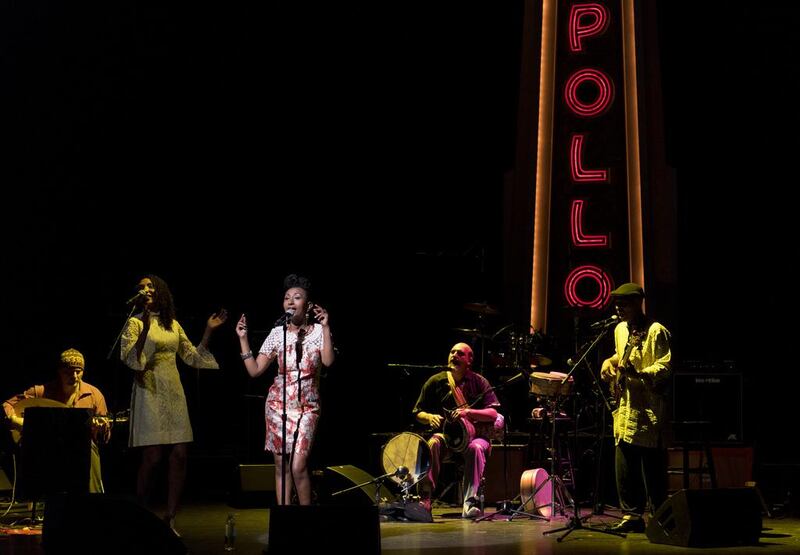At the heart of Alsarah & the Nubatones' second album, Manara, is the concept of home. What is it? Where is it? What does it sound like? The Brooklyn-based quintet define their sound as "East African retro pop", drawing from a wide range of musical influences – from Ethiopia and Zanzibar to Kenya, Egypt and Sudan – and particularly traditional Nubian "songs of return".
Nubia, a region along the Nile spanning from southern Egypt to northern Sudan, was one of the earliest civilisations in ancient Africa, but in the early 1970s, the community was displaced en masse as a result of the construction of dams at Aswan, which submerged large swathes of land under an artificial lake.
Songs of return are a communal expression of regret for these lost homelands – songs of exile and remembrance that transcend cultural barriers to speak to displaced communities around the world.
Born Sarah Mohamed Abunama-Elgadi, Alsarah lived in Sudan until the age of 8, when her family was forced to flee to Yemen as a result of the 1989 coup. Four years later, the war in Yemen forced them to move again, this time to Massachusetts. Now based in Brooklyn, New York, Alsarah says her experiences of migration are inextricably entwined with her music and identity.
"I identify as an immigrant first and foremost, more than anything else," Alsarah told The National midway through a regional tour featuring performances in Beirut, Amman and Ramallah.
“I’m an immigrant who had multiple statuses of being – from refugee, to illegal, to in-between papers, to legal, to a naturalised citizen – and if there is one thing I know that I have in common with people, it’s the idea of being uprooted. Humanity reacts to that dislocation in a really similar way, because at the end of the day, people are more similar than they are different.”
Alsarah's bandmates are a diverse crew, who share experiences of displacement. The line-up on Manara – released by Wonderwheel Recordings – includes Egyptian Rami El Aasser on percussion and backing vocals, Togolese Mawuena Kodjovi on bass and trumpet, Brandon Terzic (an American with Irish, Croatian and Hungarian roots) on oud and ngoni, and Alsarah's sister, Nahid, on backing vocals and additional percussion.
Their personal experiences fed into the process of writing the songs on Manara, most of which were composed during a sabbatical in Morocco. "These songs were born out of a lot of conversations between us, out of good food and talking and fighting and the things that affect us," says Alsarah. "For example, Nar was written in direct reaction to what's been going on in Syria and in the Middle East and all over the world … everything that's been going on with this global refusal when it comes to accepting refugees brought up a lot of personal stuff, I think, for all of us as immigrants. We are all people who wouldn't exist if we didn't have the ability to relocate."
The group wrote all but two of the songs on Manara, a flowing, melodic album that combines upbeat percussion with subtle vocal harmonies and delicate, melodic accompaniment from the oud and ngoni. The album explores themes of movement and migration, exile and return, love and remembrance and identity and selfhood.
While the group's debut album, Silt, was more directly influenced by traditional Nubian songs of return, Manara features a blend of Alsarah's East-African retro- pop style and Arabic lyrics with electronic embellishments and a more contemporary edge – a hint of Brooklyn influence, perhaps.
“I am nothing but the sum of all the experiences that I’ve had and a big chunk of those is Brooklyn, which is my home now,” says Alsarah. “I think that definitely comes through in the music.
“Brooklyn is what taught me to love my roots, to explore my roots, to go home again through music, because I had so many neighbours from so many different places all willing to go home through their music. For me it was a place of empowerment and I think that comes through.”
Hints of Morocco also make themselves felt on certain tracks, one of which is named Asileh, after the seaside town that hosted them. "We all love Morocco in a really special way," says Alsarah. "We were by the sea and there were gnawa masters playing downstairs under our balcony every day, all day.
"I always believe in the sounds of the street around you … I feel like the sound of the ocean really seeped in. To me even the sun has a sound of its own. So I feel like Asilah was in there and we needed to make an ode to it."
For Alsarah, Manara is a continuation of what the group began with Silt back in 2014.
"I think Manara is about diving deeper into the sound we established in the first album … and exploring what it means to us," she says. "These songs are much more about how we relate to what inspires us about the songs of return, which was the idea of losing a home that you can never return to because it can never really exist the same way because you can never really exist the same way.
"To me, Manara is almost my own take on songs of return. It's its own ode to the Nile."
artslife@thenational.ae





